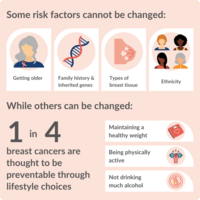Epidemiology and etiology of breast cancer

Breast cancer is a disease that can happen to women when the cells in their breast start growing in an uncontrolled way. Epidemiology is the study of patterns of diseases in different groups of people. It helps doctors and researchers understand who is more likely to get a disease and why. Etiology, on the other hand, refers to the causes and origins of diseases.
In the case of breast cancer, epidemiologists have found that certain factors can increase the risk of getting it. These include:
- Gender: Women are more likely to get breast cancer than men.
- Age: The risk of breast cancer increases as a woman gets older.
- Family history: Women whose family members (especially mother, sister, or daughter) have had breast cancer are more likely to develop it.
- Genetic mutations: Some women have inherited genetic mutations that increase their risk of breast cancer, such as the BRCA1 or BRCA2 genes.
- Exposure to hormones: Women who have been exposed to hormones, such as those used in hormone replacement therapy, may have a higher risk of developing breast cancer.
- Lifestyle choices: Certain lifestyle choices, such as not getting regular exercise, drinking alcohol, or being overweight, may increase a woman's risk of breast cancer.
Etiologists, meanwhile, have been trying to understand the biological processes that lead to the development of breast cancer. Breast cancer usually begins in the cells of the milk-producing ducts or lobules in the breast. When the DNA inside these cells becomes damaged or mutated, the cell can start dividing and growing uncontrollably, forming a tumor.
There are different types of breast cancer, each with their own unique characteristics. Some breast cancers may be fueled by hormones such as estrogen or progesterone, while others may not. Certain types of breast cancer may be more aggressive and fast-growing, while others may be slow-growing.
Scientists are still trying to understand why some women get breast cancer while others do not. The goal is to develop better ways to prevent or treat breast cancer in the future.
In the case of breast cancer, epidemiologists have found that certain factors can increase the risk of getting it. These include:
- Gender: Women are more likely to get breast cancer than men.
- Age: The risk of breast cancer increases as a woman gets older.
- Family history: Women whose family members (especially mother, sister, or daughter) have had breast cancer are more likely to develop it.
- Genetic mutations: Some women have inherited genetic mutations that increase their risk of breast cancer, such as the BRCA1 or BRCA2 genes.
- Exposure to hormones: Women who have been exposed to hormones, such as those used in hormone replacement therapy, may have a higher risk of developing breast cancer.
- Lifestyle choices: Certain lifestyle choices, such as not getting regular exercise, drinking alcohol, or being overweight, may increase a woman's risk of breast cancer.
Etiologists, meanwhile, have been trying to understand the biological processes that lead to the development of breast cancer. Breast cancer usually begins in the cells of the milk-producing ducts or lobules in the breast. When the DNA inside these cells becomes damaged or mutated, the cell can start dividing and growing uncontrollably, forming a tumor.
There are different types of breast cancer, each with their own unique characteristics. Some breast cancers may be fueled by hormones such as estrogen or progesterone, while others may not. Certain types of breast cancer may be more aggressive and fast-growing, while others may be slow-growing.
Scientists are still trying to understand why some women get breast cancer while others do not. The goal is to develop better ways to prevent or treat breast cancer in the future.
Related topics others have asked about:
